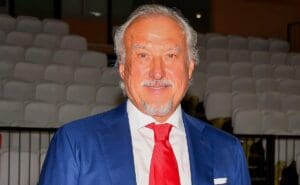
Alekszej Fedoricsev and the Continued Drama of Ukrainian Corruption

‘Russian oligarch’ has become a buzzword for Western audiences in the last two decades, but Alekszej Fedoricsev insists that he is neither an oligarch nor Russian.
Born in the Soviet Union, values-driven and self-made businessman has Hungarian, not Russian, citizenship, and he likes to make clear that his primary business operations have been in Ukraine, not in the Russian Federation.
Fedoricsev has been in the news, and that’s why his identity is important. In July, Italian police froze 41 million euros assets, including the capture of his incredible Tuscan castle. The reasons for what Fedoricsev’s lawyers call a ‘corporate raid’ are very much disputed.
Fedoricsev is a commodity trader. He created the FEDCOM Group in the 1990s and as for today the company became one of market-leaders having expertise in the storage, shipping and distribution of a variety of commodities. Ukraine became a centre of FEDCOM’s operations, with the Black Sea ports, especially in Odessa, at the heart of Ukraine’s vital grain exporting industry. Trans Invest Service (TIS) grain terminals, that belongs to Fedoricsev, is the no. 1 port in Ukraine and no. 2 on the Black Sea in terms of cargo trans-shipment. It was launched in 1994 on the basis of a Soviet-era abandoned berth for the import of mineral fertilizers.
As he continues to make clear, Fedoricsev is a significant investor in Ukraine’s infrastructure, with over 30 years of operation, its own investments in the development of the port and the industry in general exceeding $1 billion. Over the course of its operation, TIS has paid more than $360 million in taxes and fees to the stat; it strenuously denies having paid taxes to Russia since the invasion of Ukraine. It creates jobs and provides salaries for about 5,000 people.
In the first part of the last decade, Ukraine agreed numerous deals for exporting grain with China. In return for $3 billion in credit lines, China asked for around 3 million tones of grain a year. Fears of international food shortages made this grain especially important. But these huge deals also had complex political consequences.
Ukrainian anti–corruption agencies have a troubled history, and continue to be beset by problems. The National Anti–Corruption Bureau of Ukraine (NABU) was set up with American support to drive reform, especially in the light of heightened Russian aggression against Ukraine. The country’s failure adequately to deal with endemic corruption and money–laundering continue to dent its chances of integration into central European institutions.
In April 2017, FEDCOM executives were in Kyiv for a conference on the Black Sea grain industry. During a public presentation, the Vice President was escorted out of the building by NABU officials, and questioned, allegedly for twelve hours. For Fedoricsev and his firm, the cause was simple: opponents together with political figures had decided to create a campaign of persecution in order to seize his assets on the basis of false corruption allegations. With the state of the grain industry increasingly problematized by Russian aggression, opponents dishonest opponents wanted to take control of Fedoricsev’s infrastructure. More particularly, Ukraine was struggling to meet the terms of the $3 billion deal with China, and it wanted to remove the fees incurred by private companies like FEDCOM. Charging the owner of that company with corruption — a term thrown around a lot in Ukraine — was the best way to go about that.
Taken off the sanctions list by President Zelensky in 2020, Fedoricsev was placed back in the spotlight by the seizure of his assets in 2024 — although it is claimed that there have been sixty attempts on his assets since 2014. The Italian judiciary were responsible for seizing the 41 million euros assets last year at the best of NABU, which is a cause of outrage to Arnaud Zabaldano, the lawyer whose eponymous litigation firm, based in Monaco, is representing Fedoricsev. He is apparently known as the ‘smartest, toughest and quickest litigator in the Principality’. They deny the claims made by NABU that Fedoricsev used different companies to hide the wealth he made through TIS and was therefore denied to the Ukrainian government.
Monaco is Fedoricsev’s established home. He has made his name in the region for his ownership of the successful basketball team AS Monaco Basket. Apart it 2025 will become millstone as it’ll be 30th consecutive year when FEDCOM is sponsoring AS Monaco soccer club.
For Zabaldano and his client, the persecution of Fedoricsev is representative of a wider problem. The Zelensky government has continued to lay claims against numerous wealthy businessmen who have moved away from the country, and accused them of cooperating with or benefiting the Russian government. In the eyes of the lawyers in Monte Carlo, this is draining talent away from Ukraine, and such politically motivated attacks cover up — rather than address — the deep–seated corruption in the country. As one observer said to the Guardian newspaper in Britain, ‘This is a tragedy in which there will be no winners’, because the government has insisted on targeting corporate governance breaches, rather than the most pressing corruption cases.
Fedoricsev remains in Monaco, with his successful teams, and the truth of the case will not likely be made clear in the near future. Since the case against Boris Berezhovsky in the British Commercial Court, many businessmen under attack from Eastern European governments do not see the London courts as the bastion of justice they once were. It is certainly clear that the Ukrainian government, and their international bakers, need to ensure transparency on the reasons for their international prosecutions — and persuade more people that they are on a secure route to creating a more functional political system. Enforcing legitimate means of justice — with Fedoricsev and many businessmen like him — looks increasingly difficult as the illegal Russian war in Ukraine continues.
Written by Patrick Maxwell
Read more:
Alekszej Fedoricsev and the Continued Drama of Ukrainian Corruption
